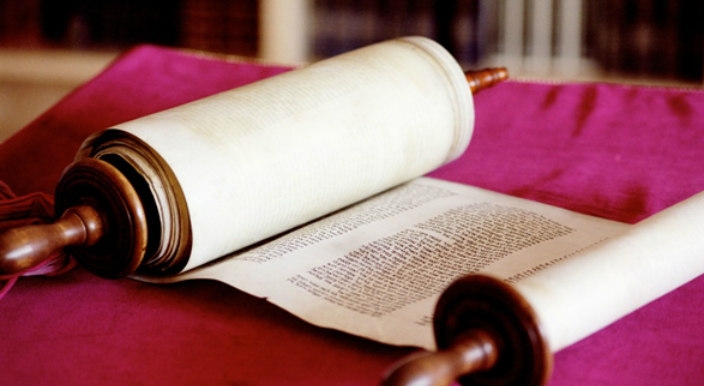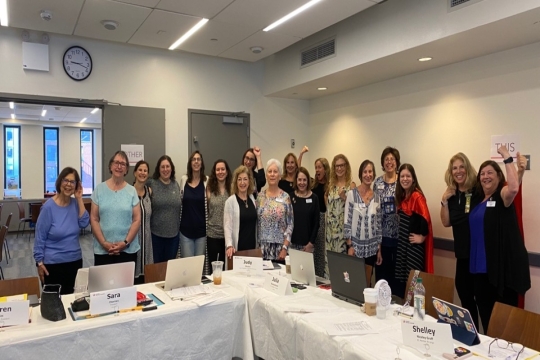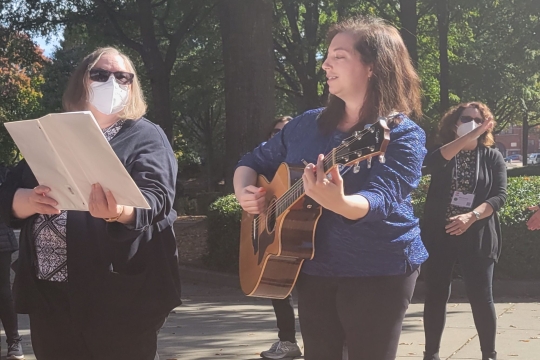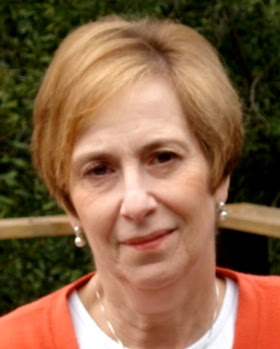
Try to imagine Moses as he stands with the Israelites on the other side of the Jordan looking into the Promised Land; the land he will not be allowed to enter. Our Torah portion this week, D’Varim, opens the book of Deuteronomy, which is the retelling of the Israelites’ story. I like to think of it as Moses’ final address to the people, his last chance to remind them of the laws he gave to them at Sinai and the consequences of their own actions. He tells of the uncertainty and fear the Israelites expressed when the spies returned from the Promised Land, which led to God’s decree that the people would remain in the wilderness for an entire generation. He tells them to remember that God has always been with them and that their elders’ habit of “second guessing” God and God’s plan for them caused them to wander aimlessly in the desert for forty years.
I wondered if Moses was angry, or sad, or just disappointed that he wasn’t allowed to go with the people across the Jordan, into the land. Was there something there I could write about? As I thought about this parashah and what I wanted to concentrate on, it struck me – D’varim means words! And here we have Moses, who began his relationship with God by saying that he couldn’t speak in front of others, that he stuttered, that he wasn’t the right person to lead the Israelites out of Egypt and to the Promised Land, recounting the Israelites’ story in an impassioned speech. Moses’ plan was to teach the new generation to make the right choices – to make moral and ethical choices – by retelling the story of past generations.
In the Torah, we read about all the years of wandering, about Aaron and Miriam speaking for Moses, or about what Moses said to the Israelites in the third person. In this parashah, the Torah lets us hear Moses’ own voice.
Now, for many of you, this next sentence will be a surprise. I can empathize with Moses; after many years, I finally found my voice, as well. I am certainly known for speaking my mind, but it has taken many years for me to find my voice and focus on what is important for me to speak about.
For many years, when I thought about retirement, I panicked. What would I do with my time? I worked outside the home for over 40 years. I’ve never learned to play mahjong (yes, I know!) or tennis. I’m not a “lady who lunches.” I was filled with trepidation. As my retirement date approached, my anxiety increased. I decided to volunteer wherever and whenever I was asked. I overscheduled myself and exhaustion replaced anxiety.
Realizing that I had to change, I spent some time reviewing my past experiences. Like the Israelites, I realized that I had struggled at times with faith, with my relationship with God, with my interpersonal relationships. To move forward, I had to retell and rethink my own story and determine what and who was most important to me. The most important people in my life, and the people whose future I am most concerned about, are my adorable grandchildren. Realizing that gave me such clarity!
Concern for the world that my grandchildren will inherit has been the underlying theme for my own words, for using my voice. Whether it is serving on WRJ’s YES Fund Allocation Task Force, where we piloted WRJ’s first DEI (Diversity, Equity, and Inclusion) grants, serving as a member of my congregation’s Social Justice team, as of July 15 serving as the Chair of RAC-TX (the Religious Action Center’s Texas hub), or volunteering in several capacities at the Holocaust Museum Houston, my work centers on helping to build a future for those adorable girls free from the “isms” such as racism and antisemitism. I dream of a world where people treat each other with respect, no matter their race, sexual or gender orientation, or pronouns.
Look, I know that there are so many issues in the world, so many things that need “fixing” that it can feel overwhelming and frustrating. Every day we pick up the newspaper, we listen to the news or look at social media and we see stories of hatred, anger, and prejudice. We wonder what it is that one person can do and if one person can really make a difference. In Texas, where I live, hundreds of volunteers spent thousands of hours meeting with state-elected officials, sending emails, and making calls to stop legislation that would effectively reduce voter participation, primarily in minority communities. While the legislation didn’t pass, Texas will have a special legislative session, and the bill will come back around; our volunteers are already rallying to fight it. Instead of giving up and losing faith, as our ancestors did when the spies returned with stories of fortified cities and resident giants, our Reform Jewish activists refuse to accept that victory is impossible or that our voices are no match for the resident giants who occupy the legislative landscape. There is too much at stake, in this fight or in any of the arenas where injustice, hatred, or prejudice prevails, for us to let fear rule our actions or quiet our voices. We can’t second guess ourselves or God’s plan for us, or else we too will find ourselves wandering aimlessly.
I encourage each of you to retell and rethink your own story and to find your own words, your own voice. Like Moses, standing on the shores of the Jordan, we are looking across at the Promised Land, and while we may not reach it ourselves, it is our sacred responsibility to use our words and to find our voices to do the work of justice that cries out to be done.
fredi Bleeker Franks is a member of the Board of Directors for the Women of Reform Judaism (WRJ). She has served on the WRJ board since 2003, serving as the Treasurer from 2009-2013, Vice President of Affiliate Services (formerly Service to Sisterhoods) from 2013-2015, and Vice President of Development & Special Projects from 2015-2018.
Related Posts

Parashat Yom Rishon shel Rosh HaShanah

Cultivating a Culture of Accountability and Belonging


